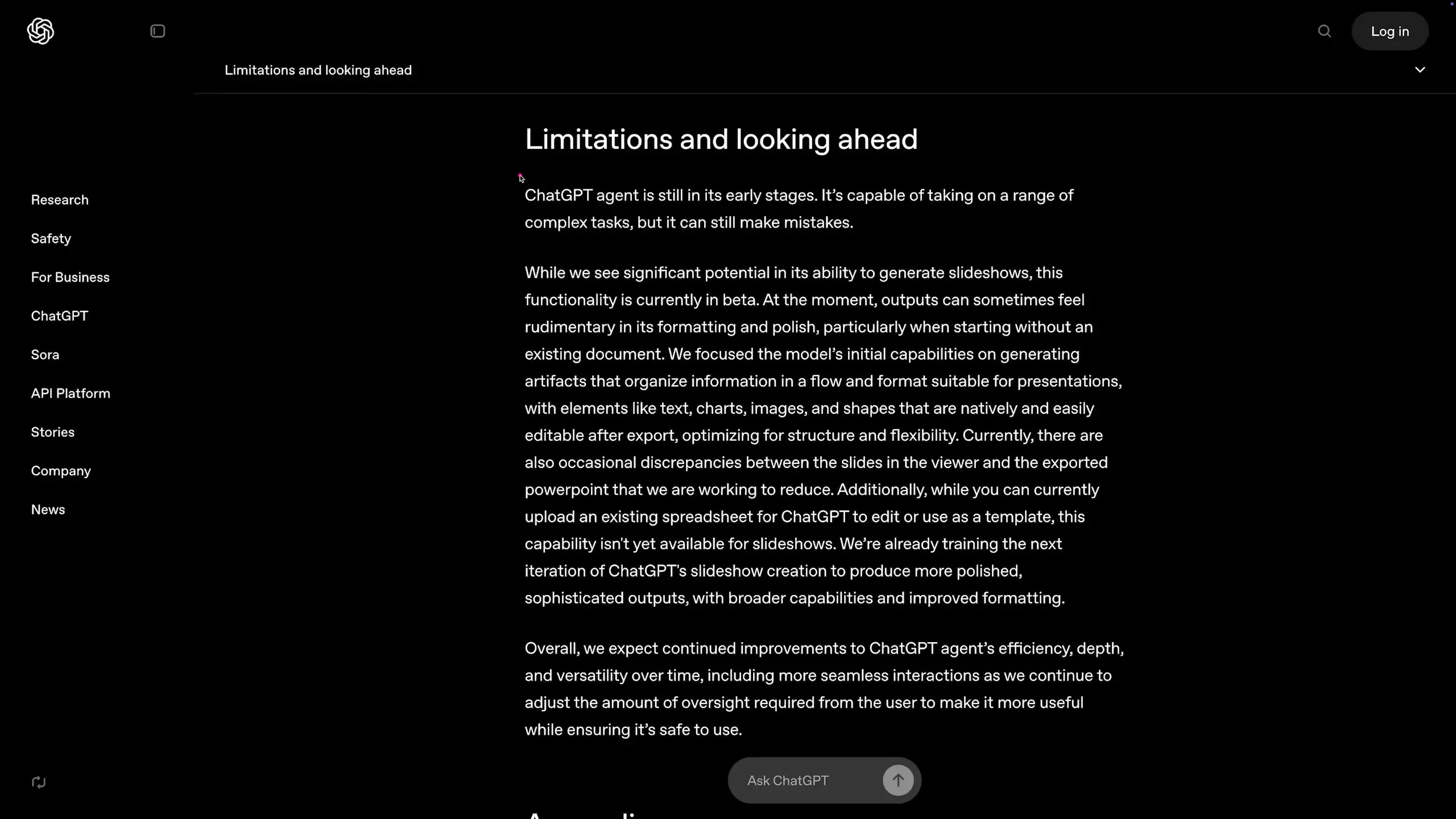
OpenAI recently announced ChatGPT Agent, a significant evolution in how we interact with artificial intelligence. This new capability allows ChatGPT (currently using GPT-3.5) to operate a virtual computer on OpenAI's servers, giving it the ability to browse the internet, manipulate spreadsheets, create presentations, and take various actions on behalf of users. While this represents a potentially transformative step in AI automation, it also introduces several concerns about security, content consumption, and the future of the internet.
What Is ChatGPT Agent and How Does It Work?
ChatGPT Agent essentially puts an AI model in the driver's seat of a virtual computer. Unlike previous iterations that could only process text inputs and generate responses, this agent can actively navigate websites, interact with web interfaces, and perform tasks that previously required human intervention. The agent can see websites as humans do, allowing it to interact with elements like buttons, forms, and other interactive components.
Some key capabilities of ChatGPT Agent include:
- Browsing the internet and extracting information from websites
- Logging into websites using provided credentials
- Working with spreadsheets and creating presentations
- Performing research tasks across multiple sources
- Accessing content behind paywalls (with proper authentication)
- Automating repetitive web-based tasks
Potential Benefits of AI Agents for Content Generation and Consumption
The introduction of AI agents like ChatGPT Agent offers several potential advantages for users looking to automate routine tasks. For instance, these agents could streamline research processes by gathering information from multiple sources and synthesizing it into coherent summaries. This represents an evolution beyond current tools like Perplexity AI, which already offer AI-powered research capabilities.
Other practical applications might include:
- Automating administrative tasks like downloading monthly invoices from various websites
- Conducting comprehensive market research across multiple platforms
- Gathering and organizing information for reports or presentations
- Monitoring websites for specific updates or changes
- Performing competitive analysis by tracking competitor content
By handling these time-consuming tasks, AI agents could theoretically free up human time for more creative and strategic work. However, as with any technological advancement, the benefits come with significant caveats and concerns.
Security Concerns and Trust Issues with AI Agents
Giving an AI agent the ability to interact with websites on your behalf introduces substantial security and privacy concerns. When you provide login credentials to access password-protected content, you're essentially giving the AI system permission to act as you online. This raises several important questions about the limits of this access and potential misuse.
Some key security concerns include:
- The AI could potentially post comments, make social media posts, or take other actions in your name
- It might access sensitive information beyond what was intended
- The system could make unintended changes to accounts or settings
- Your credentials could be exposed to security vulnerabilities
- The AI might make decisions that have financial or reputational consequences
Even with proper guardrails in place, the question remains: how much control should we cede to AI systems? The level of trust required to give an AI agent your banking credentials, for example, is substantial and may not be justified given the current state of the technology.

A New Attack Vector: Prompt Injection in the Age of AI Agents
Perhaps one of the most concerning aspects of AI agents is the emergence of a new attack vector: prompt injection attacks specifically targeting these automated systems. Similar to how web developers have had to defend against SQL injection and cross-site scripting (XSS) attacks, we now face the challenge of malicious actors crafting content designed to manipulate AI agents.

These prompt injection attacks could take various forms:
- Websites containing hidden instructions that override the AI's original directives
- Comments or user-generated content on legitimate sites that contain malicious prompts
- Content specifically designed to trick AI agents into performing unauthorized actions
- Instructions that could redirect the AI to transfer funds, share sensitive information, or take other harmful actions
For website owners, this presents a significant new challenge. Beyond sanitizing inputs for traditional security vulnerabilities, they must now consider how user-generated content might affect AI agents visiting their sites. Detecting and preventing prompt injection is arguably more complex than addressing traditional web vulnerabilities, as the attack surface is broader and less defined.
The Impact of AI-Generated Content on Web Quality and Innovation
Beyond security concerns, there's a broader question about how AI agents might transform the internet itself. As more content is generated by AI for consumption by other AI systems, we risk creating a web that's increasingly detached from human creativity and innovation.

This shift could have several concerning implications:
- Reduction in original, human-created content as more websites optimize for AI consumption
- Homogenization of content as AI systems tend to produce similar outputs based on training data
- Decreased innovation as novel ideas typically come from human creativity and unique perspectives
- Potential echo chambers where AI systems reference other AI-generated content, reinforcing existing patterns
- Loss of the human touch that makes the web a rich, diverse ecosystem of ideas and expressions
We're already seeing shifts in how people interact with the web, with many users relying on AI tools like ChatGPT and Google's AI Overview rather than visiting individual websites. This trend could accelerate with the introduction of more capable AI agents, potentially transforming the internet from a human-to-human communication medium to a machine-to-machine one.
Defensive Measures and the Future of Web Interaction
As AI agents become more prevalent, websites might implement defensive measures to ensure they're being accessed by humans rather than automated systems. This could include more sophisticated CAPTCHA systems, paywalls, or technical barriers designed to thwart AI agents. However, these defenses face significant challenges:
- If AI agents operate virtual computers that mimic human browsing behavior, detecting them becomes increasingly difficult
- Websites implementing strong anti-AI measures might lose visibility and traffic in an ecosystem increasingly dominated by AI-mediated browsing
- The technical arms race between AI systems and defensive measures could lead to a fragmented web experience
- Small content creators might lack the resources to implement effective defenses against AI scraping
The question becomes whether such defensive measures are sustainable or even desirable in the long term. If users increasingly prefer AI-mediated browsing experiences, websites that resist this trend might find themselves marginalized, regardless of their content quality.
Finding Balance in an AI-Augmented Web
Despite these concerns, technological evolution has often brought both challenges and opportunities. The key will be finding a balance that preserves the human element of the web while leveraging AI capabilities to enhance rather than replace human creativity and decision-making.
Some potential approaches to this balance include:
- Developing ethical guidelines for AI agent development and deployment
- Creating transparency requirements so users understand when they're interacting with AI-generated content
- Implementing robust security measures to protect against prompt injection and other AI-specific vulnerabilities
- Preserving spaces for human-to-human interaction alongside AI-mediated experiences
- Focusing AI development on augmenting human capabilities rather than replacing human judgment
Conclusion: Navigating the Evolving Relationship Between AI and Content
ChatGPT Agent represents a significant step in the evolution of AI's role in content generation and consumption. While it offers potential efficiency gains and automation benefits, it also introduces profound questions about security, trust, and the future nature of web content.
As we navigate this changing landscape, both developers and users will need to carefully consider the implications of giving AI systems greater autonomy. The challenge will be harnessing the benefits of AI automation while preserving the human creativity, diversity, and innovation that have made the internet such a transformative medium.
The web has evolved dramatically since its inception, and this latest shift toward AI-mediated experiences represents another significant transformation. Whether this change ultimately enhances or diminishes the internet's value will depend largely on how we collectively choose to implement and interact with these emerging technologies.
Let's Watch!
ChatGPT Agent: How AI Automation Is Reshaping Web Interactions
Ready to enhance your neural network?
Access our quantum knowledge cores and upgrade your programming abilities.
Initialize Training Sequence